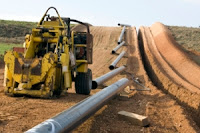Toyota wins Juba Lamu pipeline contract
 |
| A Pipeline under construction |
Toyota had earlier placed an unsolicited bid for the construction of the
Pipelines and other accessories. The US$3 billion project is to be built on a
PPP basis under a 20 year concession. For more info go to http://eaers.blogspot.com/2012/08/toyota-bids-for-africas-largest-ppp_20.html
The pipeline will initially
transport some 700,000 to one million barrels per day (bpd) of Sudanese crude
to the Lamu Port in Kenya. Eventually it is expected to transport crude from
Kenya and Uganda to the Lamu port for export. Uganda is said to be considering
using the same pipeline to transport her crude oil.
Apart from the 2000Km Pipeline, the contract also includes the construction
“of an oil refinery, power stations, jetties and other infrastructure
facilities” said Dennis Awori, Chairman-Toyota Kenya Ltd last year.
The contract is the largest PPP project in Africa. The construction is
expected to last 18 months to the end of 2014 though some analysts say that
such projects last three years citing logistical and security concerns in the
general area on which the pipeline is to be constructed.
 |
| The Lapsset Corridor from Lamu in Kenya to Juba in South Sudan |
The contract was awarded a few months after Kenya awarded the contract to
build the first three berth of the 32-berth Lamu Port. See http://eaers.blogspot.com/2013/04/lapsset-corridorus500million-down.html
This is the second time Sudan has
Chosen Kenya as her gateway to the world. Last year South Sudan chose to route
her communications infrastructure through Kenya.
South Sudan, the newest nation in Africa, has been embroiled in what could
be termed as sibling rivalry with the republic of Sudan. South Sudan split from
the greater Sudan about two years ago.
The split caused immediate economic hardship to the Sudan as the South took
with her 75 per cent of the crude oil produce in the then Republic of Sudan. Both
countries depend on oil exports to support 80 per cent of their budget.
The dispute with her Northern neighbour, through who all oil export infrastructure
is routed, has the latter block oil exports of oil from South Sudan over
transit fees. See http://eaers.blogspot.com/2011/12/revealed-why-frequent-spats-among.html.
This move effectively mark s the end of economic co-operation between South Sudan and her norther neighbour. The North is a temperamental state that results to arm twisting tactics to get her way.
This move effectively mark s the end of economic co-operation between South Sudan and her norther neighbour. The North is a temperamental state that results to arm twisting tactics to get her way.
The move by South Sudan is the
second volley on what seems to be an East-East Rivalry for influence and
business in east Africa. Although Japan was the first to express interest in
building the oil pipeline, which is a component of the Lapsset. Lapsset, is an acronym
for Lamu Port South Sudan Ethiopia transport corridor. The US$23 billion corridor
will link Kenya-Ethiopia and South Sudan by road, rail and oil pipeline.
China has also expressed interest in financing the corridor. Already a
Chines firm has been contracted by the Kenya government to build three-berths
in the Port. The construction is expected to start in the second half of this
year.



Comments
Post a Comment